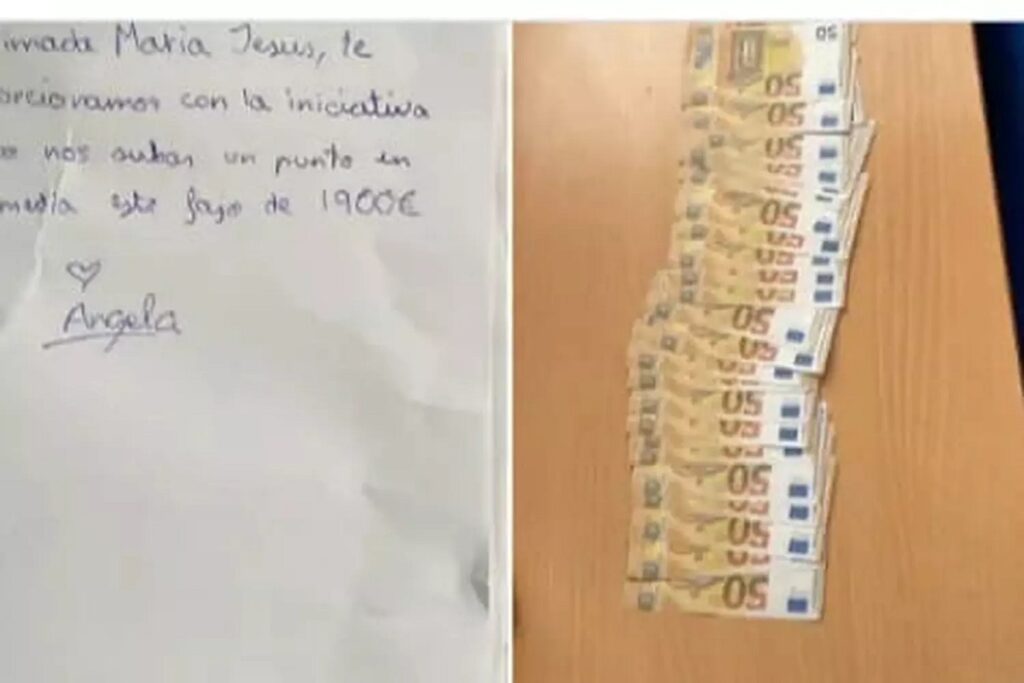Teachers often encounter unexpected moments in their classrooms, but one educator in Spain was left utterly speechless when she discovered €1900 in cash on her desk, accompanied by a note from two of her students. The incident quickly captured widespread attention online, sparking debate about the students’ motives and the teacher’s response.
An Unexpected Surprise
It all started when María Jesús, a teacher from Spain, walked into her classroom and was taken aback to find a pile of 50-euro notes meticulously arranged on one of the desks. The staggering total? A remarkable €1900 in cash. The money was paired with a letter signed by two of her pupils. Intrigued by the gesture, María Jesús shared a photo of the cash on her social media, captioning it: “My job is wonderful. I walked into class and found this from two students.”
Her post quickly went viral, racking up over 3 million views and 24,000 likes. The reactions were a mixed bag. While some viewers were astonished, others expressed skepticism about whether the money was legitimate. A few even speculated that the students may have printed fake bills as a prank.
The Motive Behind the Gesture
So what motivated these two students to leave such a significant sum for their teacher? As it turns out, the cash was intended as a bribe—the students hoped to persuade María Jesús to grant them an extra point on their final grades. One student had penned in the letter: “Dear María Jesús, in support of your proposal to raise our grades by one point, we offer you this package of €1900.”
The response to the students’ gesture was predictably polarising. Many social media users were outraged, with one commenting, “Wonderful? These students deserve a serious talking-to for attempting to bribe a teacher. This behaviour is unacceptable, and definitely not something to endorse.”
Conversely, others held a different view. Some praised the students, remarking, “These girls clearly understand how the world works. They will thrive in whatever they pursue.” It was evident that the episode raised significant questions about the lengths to which students might go for better grades.
The Broader Context of Bribery in Education
While bribery in education may appear shocking, it’s not a novel issue. In various parts of the globe, students have historically attempted to sway their grades through gifts or other forms of flattery. This case serves as a stark reminder of the lengths individuals may go to achieve academic success.
In fact, sociologist Pierre Merle has argued that students often devise strategies to enhance their grades by manipulating teachers’ perceptions. According to Merle, turning in assignments in the first third of the grading pile could increase a student’s chances of receiving a higher mark, as teachers may not compare it to as many others. Additionally, teachers may be more inclined to award higher grades to students perceived as dedicated, regardless of the genuine quality of their work.
While such tactics may be less overt than outright bribery, they underscore a larger concern in education: how much of academic success is genuinely merit-based, and how much relies on the perception of effort or external influence?
The Teacher’s Disposition
As for María Jesús, her complete response to the incident remains unclear, but one thing is evident: the students’ bribe did not go unnoticed. This situation has ignited a crucial dialogue about the ethics of grading and what constitutes fairness in evaluating student performance. Should students feel compelled to resort to such extreme measures to get ahead, or does this reflect a deeper systemic issue that warrants attention?
This story, while amusing to some, raises serious concerns regarding integrity within education. As societal expectations evolve, so does the pressure on students to excel, often at any cost. Whether through hard work, strategic positioning, or, as seen in this case, bribery, students are continuously searching for ways to gain an advantage. The pivotal question remains: what does this imply about the educational system, and how can we ensure that grades accurately reflect a student’s true abilities and efforts, rather than their capacity to game the system?







